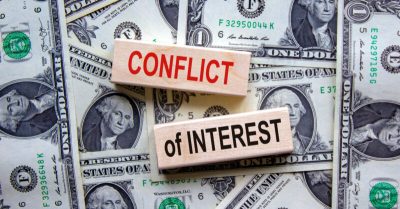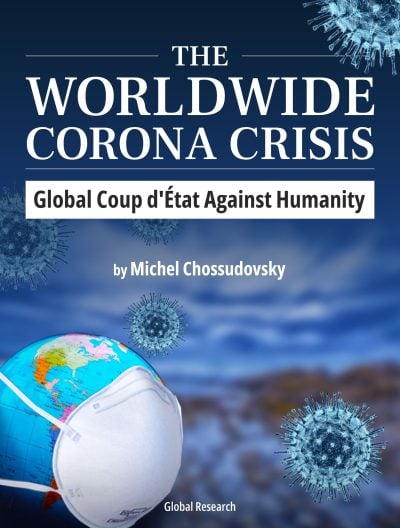Video: Conflicts of Interest. Royalties to Corrupt Scientists

All Global Research articles can be read in 51 languages by activating the Translate Website button below the author’s name (desktop version)
To receive Global Research’s Daily Newsletter (selected articles), click here.
Follow us on Instagram and Twitter and subscribe to our Telegram Channel. Feel free to repost and share widely Global Research articles.
***
Polls show that public trust in the scientific establishment has suffered immensely in the wake of Covid. That’s prompted many to ask questions about conflicts of interest. Today, with the help of a watchdog group, we look at the issue of government scientists collecting royalty payments from pharmaceutical companies for discoveries made while working on your dime.
Transcript
Adam Andrzejewski: So our data shows at OpenTheBooks.com that every single year, NIH doles out $32 billion in federal grant-making to 56,000 entities. And that basically buys you the entire American health care space.
Adam Andrzejewski of the watchdog group Open The Books says the National Institutes of Health, or NIH, accumulates great influence with the power to decide which scientists and projects get all those taxpayer billions.
Adam Andrzejewski: Buys you a lot of friends, buys you a lot of allies, and there’s great incentive to stay on the establishment narratives that NIH disseminates on public health policy.
And he says there’s reason to question who or what is influencing those policies.
Under a 1984 law known as Bayh-Dole, government scientists have a unique arrangement. They can collect royalties from pharmaceutical companies for discoveries they make while working for us.
Andrzejewski: So here’s how the third-party royalty complex works. You have a government scientist funded by taxpayers, and they work in a government lab that’s also funded by taxpayers. And when they have an invention, they have a special situation. The NIH, National Institutes of Health, then licenses that invention —
Sharyl: An invention meaning a drug or a device?
Andrzejewski: — yes, or therapeutic, to the private sector. And the private sector then pays royalties back to NIH. NIH then distributes those royalties on a split, a royalty split schedule, back to the scientist.
Details of those royalty payments to government scientists are kept as strictly held secrets.
Republican Senator Rand Paul tried to pry some of them loose when questioning Dr. Anthony Fauci, then head of the National Institute of Allergy and Infectious Diseases.
Sen. Rand Paul: Can you tell me that you have not received a royalty from any entity that you ever oversaw the distribution of money and research grants?
Anthony Fauci: Um, well first of all, let’s talk about royalties
Paul: That’s the question. No, that’s the question (Crosstalk) Have you ever received a royalty payment from a company that you later oversaw money going to that company?
Fauci: You know, I don’t know as a fact, but I doubt it.
Paul: It’s not just about you. Everyone on the vaccine committee — have any of them ever received money from the people who make vaccines? Can you tell me that? Can you tell me if anybody on the vaccine approval committees ever received any money from (Crosstalk)… people who make the vaccines?
Fauci: Sound bite number one, are you gonna let me answer a question? Ok. So let me give you some information. First of all, according to the regulations, people who receive royalties are not required to divulge them even on their financial statement, according to the Bayh-Dole Act.
Sharyl: And he literally told Congress more or less, “It’s none of your business. I don’t have to tell you these things,” which is pretty surprising because it would seem to be important.
Andrzejewski: So during the pandemic, I think the American people started to ask the question, “Just how close is big government to big pharma?”
Open The Books sued to try to get some of the hidden answers. That lawsuit unearthed 3,000 pages of royalty payments to NIH scientists from 2010 to 2021. During that time, 2,407 government scientists received $325 million in secretive royalty payments, averaging out to more than $135,000 each.
But much is left unknown. NIH redacted or blacked out key details.
Andrzejewski: We don’t know who paid it. We don’t know how much each individual scientist received. We can only see their names and count the number of times that each scientist received a payment. And they also redacted the invention, the license number or the patent number.
Sharyl: How does this stand, do you think, to impact the work the government does on behalf of public health? What conflicts arise?
Andrzejewski: So every single one of those individual, third-party royalty payments has the appearance of a conflict of interest.
Take the example of Covid vaccines. Andrzejewski says the first Covid vaccine to get government approval was Pfizer’s, which happens to be part of an NIH royalty-sharing agreement.
Sharyl: Does that mean NIH helped invent the vaccine and then licensed some of the technology to Pfizer?
Andrzejewski: Yes.
Sharyl: What does that imply?
Andrzejewski: Right, exactly. The NIH invented certain aspects of the vaccine that was licensed to Pfizer. When they developed it, they have to pay that royalty. And so, and so NIH was receiving tens of millions of dollars from Pfizer on those royalty payments.
Sharyl: What are the outstanding questions to be answered in sort of the big picture, not about the individual scientists, but from a public standpoint?
Andrzejewski: We need to be able to follow the money. Unelected bureaucrats are running the entire American health care complex without any scrutiny. They’re basically telling the American people, “Sit down, shut up, pay up. We’ll run things.” And that’s not how the federal government is supposed to operate.
Sharyl (on-camera): By the way, Fauci has refused to quantify all of his personal royalty payments, but has implied they are very small.
*
Note to readers: Please click the share buttons above. Follow us on Instagram and Twitter and subscribe to our Telegram Channel. Feel free to repost and share widely Global Research articles.
Featured image is from Children’s Health Defense
 The Worldwide Corona Crisis, Global Coup d’Etat Against Humanity
The Worldwide Corona Crisis, Global Coup d’Etat Against Humanity
by Michel Chossudovsky
Michel Chossudovsky reviews in detail how this insidious project “destroys people’s lives”. He provides a comprehensive analysis of everything you need to know about the “pandemic” — from the medical dimensions to the economic and social repercussions, political underpinnings, and mental and psychological impacts.
“My objective as an author is to inform people worldwide and refute the official narrative which has been used as a justification to destabilize the economic and social fabric of entire countries, followed by the imposition of the “deadly” COVID-19 “vaccine”. This crisis affects humanity in its entirety: almost 8 billion people. We stand in solidarity with our fellow human beings and our children worldwide. Truth is a powerful instrument.”
ISBN: 978-0-9879389-3-0, Year: 2022, PDF Ebook, Pages: 164, 15 Chapters
Price: $11.50 Get yours for FREE! Click here to download.
We encourage you to support the eBook project by making a donation through Global Research’s DonorBox “Worldwide Corona Crisis” Campaign Page.

